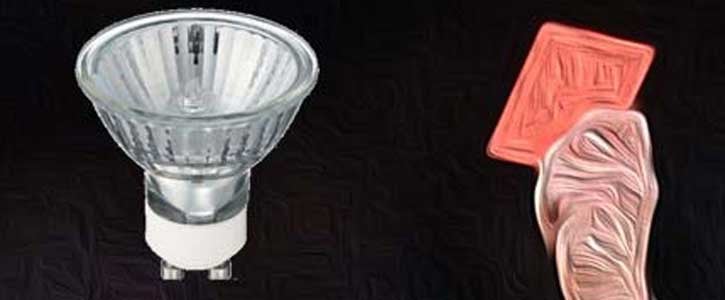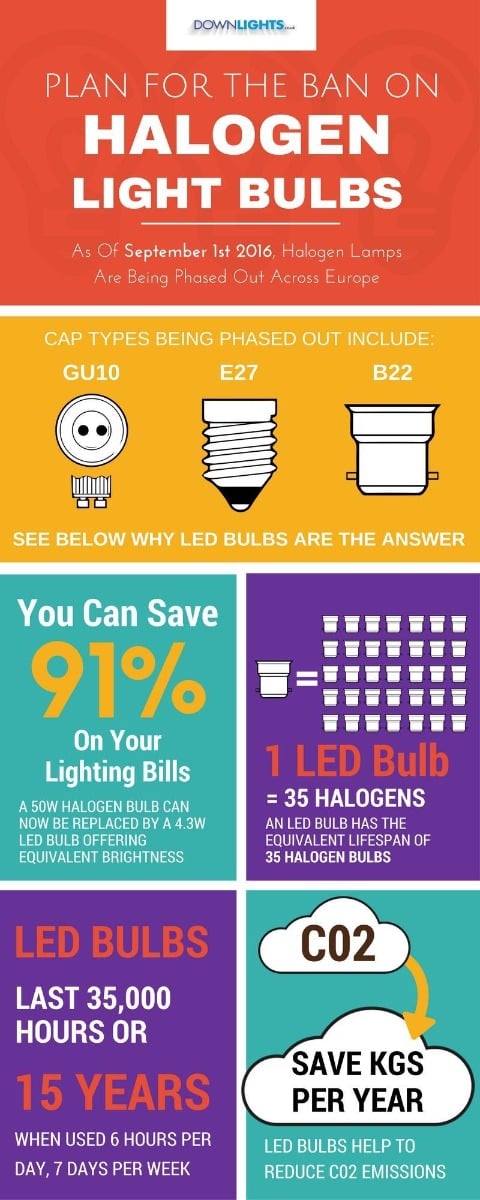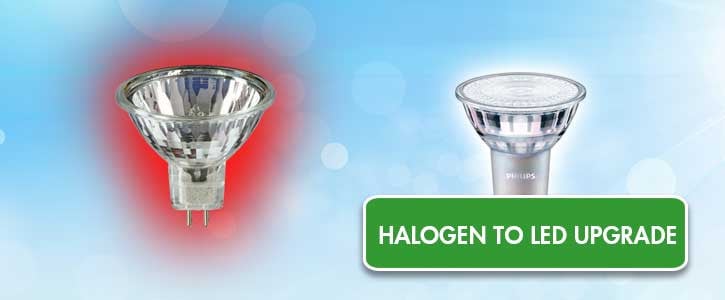Halogen Bulb Ban 2016

Halogen Bulb Ban 2016 – What Does It Mean for You?
In September 2016 AD mains voltage halogen light bulbs were banned from the EU. R.I,P. halogen, but don't panic, find out what you should do next...
Whilst there was a plan to delay the ban until September 2018, following a review by the European Commission, it was concluded that mains-voltage halogen directional lamps should be phased out from September 1st 2016. This means that from September the 1st 2016, mains voltage halogen light bulbs will no longer be manufactured or imported for sale within the EU. This includes popular cap types like GU10, E27 and B22.
GU10 halogens and other reflectors like R63, R80 and GLS style light bulbs can still be continued to be sold after this date but manufacturing will cease.
This follows on from the 2011 ban of incandescent lamps, it’s difficult to believe that’s its been so many years ago. The ban happened when LED technology was still in its infancy and very costly. Many consumers opted for CFL (Compact Flourescent Lamp) and halogen but with LED prices plummeting by as much as 70% in the 5 years that followed; maybe the ban increased the demand which helped to reduce LED prices to the masses?
The 2021 Outright Ban
In 2021, the UK Government went another step further in their persuit for a greener country by totallng ending the sale of halogens from September 2021, more information here. An interesting statistic from this ban is that they expect to cut 1.26 million tonnes of CO2, which is like removing over half a million cars from the UK's roads.
Next on the hit list of the legacy lighting technology is flourescent which is being banned from September 2023. Still used in offices and warehouses flourescent is not only around 50% less energy efficient than LED, but it also contains mercury which can be toxic to humans and very bad for the environment especially if its not disposed of correctly.
Why Is Halogen Being Banned?
Halogen lighting technology is grossly inefficient. A 50 watt halogen GU10 can now be replaced by an LED that consumes as little as 5 watts! That’s an energy saving of over 90%. I think it’s strange that consumers even need this ban to force them into becoming energy efficient as LEDs pay for themselves. It just takes that initial investment and its money in the bank.
As GU10 LED bulbs are commonly used in downlights and spotlights, you usually have lots of them in a room, meaning the total wattage can really add up, costing you a lot in energy usage. They are known for their bright, white light and their relatively long lifespan. Many consumers still prefer the LED GU10 bulb option over integrated LED technology as you can easily replace them, rather than having to replace the entire fitting.
Switching to LED
Making the transition from halogen to LED has never been easier or more economical to do. The price of a high quality dimmable GU10 LEDs from leading brands like Aurora and Philips range from just £2.21 including VAT. LEDs are designed to last for extended periods of 15,000 to 35,000 hours which is 15 to 35 times longer than halogen.
Here are some options for you to consider if you're replacing your 50 watt halogen GU10s:
- Philips Master Value 4.9W GU10 - Ideal for mimicking the dimming effects of a halogen with the Dimtone version.
- Philips CorePro 4.6W GU10 - A cost effective, non dimmable lighting option.
- Aurora Ice 5W GU10 - Available in dimmable and non dimmable, it has a nice wide beam angle of 60 degrees.
- Philips 2.4W B Rated GU10 - This is the most energy efficient GU10 LED on the market. Its only available in non dimmable, but this is 50% more efficient than its closest LED rival and 95.2% more energy efficient than halogen.
Will 'Brexit' effect the ban?
No, the Brexit result won’t have any effect on this ban. In the future, if the UK ever officially leaves the EU, it could potentially be decided to overturn the halogen ban in the UK. That would be very unlikely to happen, not unless Boris Johnson is a big fan of halogen lighting! He would then need to begin a resurrection process and bring halogen back from the dead. Most of the governments recent policies have descended us back into the dark ages, so why not?
Further Information
Here's an interesting article from 2016, written by Philips Lighting with further information about the ban and the ErP legislation.
Upgrading From Halogen to LED
If you've still got old halogen MR16 lamps which were an incredibly popular choice for downlights from the 90s and up to 2010 we've written a dedicated article that presents you with 3 options to upgrade.


